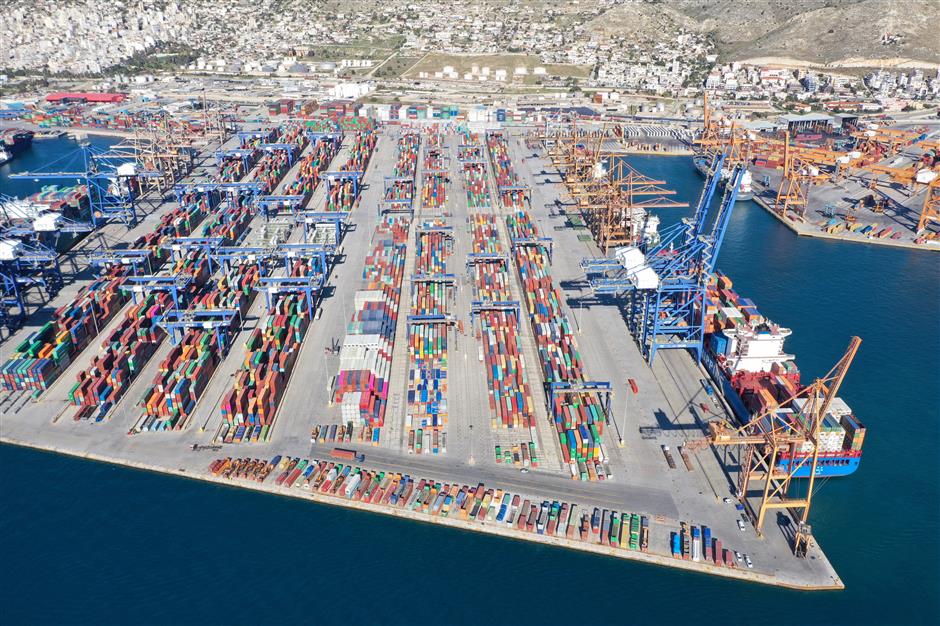China's COSCO investment revives glory days of Greek port

An aerial view of the Piraeus Port
With investment from COSCO Shipping, Greece's largest port Piraeus is boosting its role as a hub in the rapidly growing trade between Asia and Europe.
The Piraeus Port Authority, with majority owned by China COSCO Shipping since 2016, posted an annual turnover of 154.2 million euros (US$165.40 million) last year, up from 132.9 million euros in 2020.
Under COSCO, that was a historical high for the port.
"This amount was the highest level of profitability in the history of the PPA," the company said.
"Despite the difficulties we have faced due to the pandemic, our continued growth in turnover showed that we are a highly resilient company built on a solid foundation," said Yu Zenggang, chairman of Piraeus Port Authority.
It also jumped in world rankings of container volume from 93rd in 2010 to 26th in 2020, to become one of the fastest-growing container ports in the world and the top port in the Mediterranean.
On the Saronic Gulf on the western coast of the Aegean Sea, Piraeus is Greece's largest port and one of the biggest in Europe.
In 2009, after the global financial crisis, Greece leased Piraeus' docks 2 and 3 to COSCO for 35 years for 100 million euros a year.
But after the Greek government-debt crisis started in late 2009, Piraeus was caught in a vicious cycle of terminal disrepair and workers' strikes, and was on the verge of bankruptcy.
That was when the Chinese government provided loans to the Greek government and encouraged Chinese companies to increase their investment.
From 2012 to 2014, COSCO Shipping invested a total of 553 million euros to complete the construction of two terminals and for renovation projects, a full two years ahead of schedule .
At the same time, the company made efforts to create local jobs. Aside from six Chinese directors, the rest of the approximately 2,000 employees of the port are all Greeks, including all construction workers.
The company's investment had also created nearly 2,000 direct jobs in various port services such as stevedoring, storage and logistics.
"China has been investing in Greece in times when other countries shied away," Greek Prime Minister Kyriakos Mitsotakis told a Greek-Chinese business forum in 2019.
"The investment by COSCO in the port of Piraeus is an example of how an important Chinese company was bold enough to invest in an important Greek infrastructure project, at a time when Greece was considered 'uninvestable' by many other countries," the prime minister said.
China's top maritime freight company now owns 67 percent of the port, after the Hellenic Republic Asset Development Fund accepted COSCO's binding offer of 368.5 million euros (then US$418.8 million) for a controlling stake in 2016 – 51 percent was acquired in 2016 while 16 percent of escrow shares were transferred in 2021.
As part of that deal, COSCO in 2016 also promised to invest another 350 million euros over the next decade in infrastructure at the port.
The Chinese ambassador to Greece said in that year that Piraeus was "a key link in the Belt and Road Initiative."
He also spoke of Greece's potential to become a transportation hub in this part of the Mediterranean.
Studies by the Foundation for Economic and Industrial Research, a leading Greek thinktank, and other Greek and foreign experts say COSCO's development plan for the port will boost long-term revenue from the port to the Greek economy by 5.1 billion euros a year, as well as adding 125,000 jobs until the new concession agreement expires in 2052.
By 2021, the company's investment in Piraeus had created more than 3,000 direct jobs and more than 10,000 indirect jobs in Greece, bringing a cumulative direct social contribution of more than 1.4 billion euros to the local area.
It also contributed 0.78 percent of Greek GDP in 2020.
Xu Lirong, chairman of China COSCO Shipping Corp at that time (who is now retired), said when the company completed the second phase of its share acquisition in 2021 that it was aimed to further expand investment, increase its input of resources and launch new shipping routes to build the port into a regional logistics distribution center.
And in the face the global pandemic, "we will stay on the path of dynamic and sustainable growth, while staying true to our vision of expanding Piraeus Port into the largest port in Europe," PPA's Yu said.
















